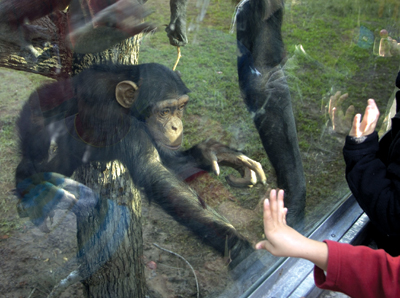|
ZOOS
Redefining Zoos
A zoo is much more than a place of
entertainment – that is, if the Israeli Zoo Association has anything to
do with it.
by Heidi J. Gleit
The
Merriam-Webster Collegiate Dictionary offers several definitions of
the word zoo, including “a place, situation, or group marked by
crowding, confusion, or unrestrained behavior.” The Israeli Zoo
Association is working hard to make sure that definition doesn’t apply
to the zoos in Israel.
The Israeli Zoo
Association aims to continually increase professionalism at Israel’s
zoos in order to enhance each zoo’s role as an institution of education,
research, and environmental conservation.
The association was
established some three years ago at the initiative of the leadership of
the Tisch Family Zoological Gardens (Biblical Zoo) of Jerusalem and the
Zoological Center of Tel Aviv-Ramat Gan (Safari), said Tommy Sadeh, who
serves on the association’s Admissions and Inspections Committee, along
with Dan Perry and Prof. Joseph Terkel of Tel Aviv University’s
Department of Zoology. Both Sadeh and Perry give much of the credit for
the association’s establishment to the late Dr. Gabi Eshkar, who was the
chief veterinarian of the Biblical Zoo.

(Tibor
Yager, courtesy of the Zoological Center Tel Aviv-Ramat Gan-Safari)
“There are
collections of animals all over Israel, but the majority of them aren’t
zoos,” Perry explained. For example, if a collection’s main aim is to
entertain visitors, then it isn’t a zoo by Israeli or international
standards. Using the standards set by international organizations as a
model, the Israeli Zoo Association set a list of criteria that zoos must
meet in order to become members. The organization also developed an
ethical code, focusing on respect for animals and humans, that members
must pledge to accept. Some of the association’s aims include preserving
endangered species, setting standards for Israel in animal care and
conservation, and increasing public awareness in Israel about endangered
species and environmental issues. It encourages the member zoos to
cooperate with international and national organizations on research and
conservation.
The most important
membership requirement is having a guiding concept, clear goals, and a
master plan for the future. The goals should include conservation and
protection of endangered species, research, education, and bringing
people closer to animals.
On a more concrete
level, “if the animals aren’t provided with respectable living
conditions, a collection doesn’t qualify for membership,” Perry said.
...
“Most of the animal
collections in Israel are pinot hai [petting zoos and animal corners],
not zoos,” Sadeh noted. Almost every school and kibbutz has created a
small area where children can play with animals. In addition to their
small size and correspondingly small budget, animal corners also have a
different mission than zoos, Perry pointed out. Their main aim is
entertainment and, to a far lesser extent, education. They usually
contain domestic animals and don’t house endangered species or conduct
research. Petting zoos are under the authority of the Israel Nature and
Parks Authority (INPA), which checks to make sure that laws regarding
animal care are not violated.
The INPA also
operates two wildlife preserves (hai bar in Hebrew), in the Carmel and
Yotvata nature reserves, where injured animals are cared for and animals
are bred and raised for introduction into the wild. Since both they and
the collection at Tel Aviv University have very specific goals, they are
not considered zoos, though they occasionally cooperate with the
association.
When the
organization was established, Perry, Sadeh, and Terkel inspected all of
the potential members to determine if they met the standards. The
Biblical Zoo, Hai Park in Kiriat Motzkin, and the Safari passed
immediately, while several others became associate members and were
asked to make specific improvements in order to gain membership. Both
the Hai Kef in Rishon Lezion and the Haifa Educational Zoo improved
significantly to an extent that surprised him and quickly attained full
membership, Perry said.
...
The association
currently has five members and several associate members. Membership,
and the responsibilities it entails, is voluntary, but most large animal
collections want the benefits of membership and so they are relating to
the organization seriously.
...
“The Israeli zoos
operate on an international level. We have nothing to be ashamed of in
comparison to great zoos in other countries,” Perry concluded.
The full
article
appeared in ERETZ Magazine 105. To read it, subscribe to ERETZ Magazine. |

